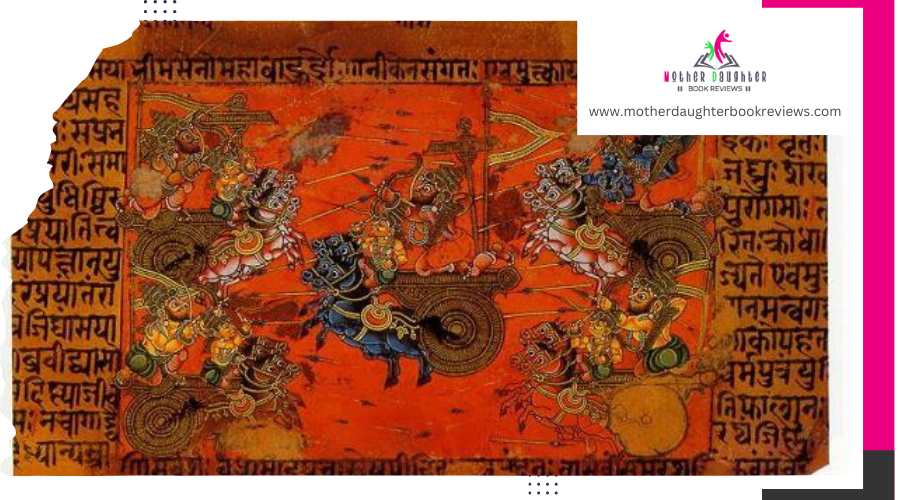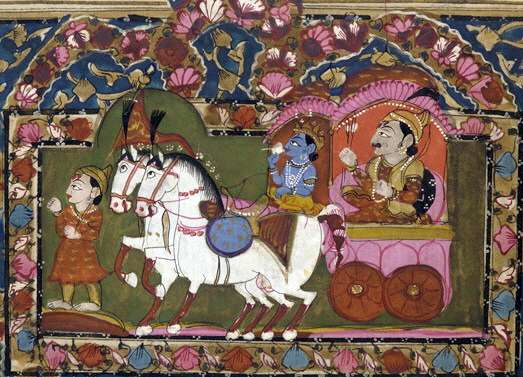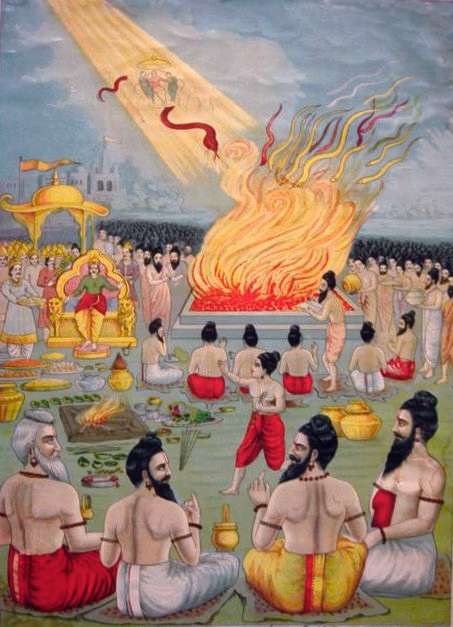The Battle for Good in The Mahabharata

In the Mahabharata, epic battles like the Kurukshetra War showcase the struggle between righteousness and ambition, hinting at life's moral complexities. Arjuna's dilemma, resolved by Krishna's guidance, teaches duty over emotion. Bhishma's vow of celibacy and loyalty emphasizes sacrifice and leadership.
Draupadi's resilience highlights courage in adversity, while Abhimanyu's sacrifice captures youthful bravery and fate's inevitability. The Pandavas' exile shows the power of perseverance, unity, and personal growth through hardship. Yudhishthira's wisdom underscores ethical conduct and inner strength. To investigate these timeless tales and their deep lessons even further, continue the expedition with the Mahabharata.
The Battle of Kurukshetra
The Battle of Kurukshetra, a vital moment in the Mahabharata, showcases the intense conflict between the Pandavas and the Kauravas. You see a war where family ties, honor, and dharma clash violently on the battlefield. This epic confrontation isn't just about physical combat; it's a struggle for righteousness and justice.
As you explore the tale, you'll witness the Pandavas, guided by their moral compass and divine aid, standing against the might of the Kauravas. The Kauravas, led by Duryodhana, represent unchecked ambition and moral decay. The battlefield becomes a stage where valor, strategy, and divine interventions play key roles. Lord Krishna, serving as Arjuna's charioteer, influences the course of the battle greatly.
You'll notice how each warrior brings unique skills and weapons into play, making every encounter memorable. Bhishma's invincibility, Drona's expertise, and Karna's loyalty create a dynamic and unpredictable narrative. The battle stretches over 18 days, filled with moments of heroism and tragedy. With each passing day, the lines between right and wrong blur, leaving you questioning the true cost of victory.
Arjuna's Dilemma
As the battlefield of Kurukshetra roars with the clashing of swords and the cries of warriors, a moment of profound introspection grips Arjuna. He stands on his chariot, paralyzed by doubt and confusion. How can he fight against his own kin, teachers, and friends? The very people who shaped his life are now arrayed against him, ready to kill or be killed. The burden of this decision overwhelms him, and he turns to Krishna, his charioteer and guide, for counsel.
You can feel Arjuna's inner turmoil. The moral conflict isn't just about the immediate battle; it's about the righteousness of his actions. Should he uphold his duty as a warrior, or should he renounce violence altogether? Krishna's advice, captured in the Bhagavad Gita, serves as a timeless lesson. He tells Arjuna that life is a series of duties, and one must act without attachment to the results. It's a lesson in selflessness and the importance of duty over personal emotions.
Arjuna's dilemma teaches you that life's challenges often demand difficult choices. It's not about the battle itself but how you navigate the moral complexities that define your character.
Bhishma's Vow
Taking a vow of celibacy and lifelong loyalty to Hastinapura, Bhishma emerges as one of the most compelling figures in the Mahabharata. You see, Bhishma's vow isn't just a simple promise; it's a monumental sacrifice. By renouncing marriage and the possibility of fatherhood, he guarantees that his father's lineage can continue without conflict. This act of selflessness sets the stage for his unwavering dedication to the throne of Hastinapura.
When Bhishma takes his vow, he demonstrates immense willpower and commitment. His decision stems from a deep sense of duty and responsibility. As a result, you witness Bhishma maneuvering through the complex politics and wars of the Mahabharata with a sense of honor rarely seen. His loyalty to the kingdom and his adherence to his principles become his guiding lights.
Bhishma's vow also teaches you about the power of personal sacrifice for a greater good. It's a lesson in prioritizing collective welfare over individual desires. Through his actions, Bhishma shows that true leadership involves making tough choices and standing by them, no matter the personal cost. His story is a powerful reminder of what it means to serve with integrity and devotion.

Draupadi's Humiliation
Draupadi's humiliation stands as one of the most heart-wrenching moments in the Mahabharata, a stark reflection of the period's deep-seated misogyny and the fragility of honor. When Yudhishthira, the eldest Pandava, wagers and loses Draupadi in a dice game to the Kauravas, you witness not just a personal betrayal but a societal failure. Draupadi is dragged into the court, and Dushasana attempts to disrobe her, intending to strip away her dignity and humanity.
As you read, you can't help but feel the weight of Draupadi's plight. She questions the legality of her situation, challenging the assembly's silence and complicity. Her strength shines through as she invokes divine intervention, and Lord Krishna responds, miraculously extending her sari to protect her modesty. This act doesn't just save Draupadi; it underscores the power of righteousness and divine justice.
Draupadi's humiliation teaches you about the importance of standing up against injustice, even when you're most vulnerable. It also highlights the roles of courage and faith in overcoming adversities. Through her ordeal, you learn that true honor lies in unwavering dignity and moral fortitude, regardless of societal constraints.
Abhimanyu's Sacrifice
Abhimanyu's sacrifice is one of the most poignant episodes in the Mahabharata, capturing the essence of youthful valor and tragic heroism. At just 16 years old, Abhimanyu, son of Arjuna, finds himself thrust into the heart of the Kurukshetra war. He's tasked with breaching the Chakravyuha, a complex, nearly impenetrable battle formation designed by the Kaurava generals.
You see Abhimanyu's sheer courage as he charges into the formation, knowing he can break in but not out. He's fully aware of the risks, yet his sense of duty and loyalty to the Pandavas drives him forward. His unmatched skills and bravery enable him to breach the Chakravyuha, fighting valiantly against seasoned warriors.
However, the odds are stacked against him. Encircled by warriors like Karna, Drona, and Duryodhana, Abhimanyu faces an inevitable fate. Despite his unparalleled bravery, he falls, a victim of treachery and overwhelming force.
Abhimanyu's sacrifice teaches you the importance of courage, duty, and the harsh reality that valor sometimes meets with tragic ends. His story reminds you that true heroism often comes with a high price, making his sacrifice an enduring symbol of youthful bravery.

Krishna's Guidance
Among the myriad lessons offered by the Mahabharata, Krishna's guidance stands as a lighthouse of wisdom and divine intervention. Throughout the epic, Krishna's counsel shapes the destiny of the Pandavas, providing you with timeless lessons on leadership, morality, and the power of faith.
Consider the significant moment in the Bhagavad Gita, where Arjuna faces a moral crisis on the battlefield. Krishna's advice helps Arjuna overcome his doubts and fulfill his duty as a warrior. Krishna emphasizes the importance of performing one's responsibilities without attachment to the results, teaching you about the value of selfless action.
Krishna also plays an essential role in steering through the complex strategies of the Kurukshetra war. From suggesting the formation of the Chakravyuha to guiding the Pandavas in their decision-making, his wisdom is indispensable. By following Krishna's guidance, you learn the importance of adaptability, strategic thinking, and ethical conduct in the face of adversity.
Moreover, Krishna's divine interventions, like revealing his universal form, remind you of the greater cosmic order and the transient nature of life. His teachings encourage you to seek a higher purpose and maintain unwavering faith, even in the most challenging times.
The Pandavas' Exile
The Pandavas' exile is a period filled with trials that test their resilience, integrity, and unity. After losing their kingdom in a deceitful game of dice, you witness the unfairness and betrayal they face. Yet, instead of succumbing to despair, they welcome the challenges, demonstrating remarkable strength and brotherhood.
During their thirteen years in exile, the Pandavas navigate through dense forests, encounter fierce adversaries, and endure extreme hardships. You see them adapt to life in the wilderness, learning to hunt, gather food, and protect each other from lurking dangers. They also meet sages and gain wisdom, which shapes their character and resolve.
Draupadi, the Pandavas' wife, plays an essential role, showing immense patience and courage despite her suffering. Her unwavering faith and support fortify the Pandavas' spirits. You can't help but admire her resilience as she stands by her husband through thick and thin.
The exile period also serves as a time for the Pandavas to reflect on their past actions and prepare for future confrontations. Their experiences teach you the value of perseverance, loyalty, and the strength that comes from unity in the face of adversity.
Yudhishthira's Wisdom
Drawing from his experiences in exile, Yudhishthira's wisdom becomes a guiding light for the Pandavas. You see, Yudhishthira learns valuable lessons about patience, humility, and righteousness during their 13 years of hardship. These virtues are not just abstract ideals; they become practical tools for steering through life's challenges.
Yudhishthira's wisdom is perhaps most evident in his responses to adversity. When Draupadi is humiliated in the Kaurava court, you witness his restraint and commitment to dharma, even in the face of extreme provocation. This teaches you that true strength lies in self-control and adherence to one's principles, no matter how trying the circumstances.
Moreover, Yudhishthira's interaction with the Yaksha in the forest is another indication of his wisdom. When asked several philosophical questions, his thoughtful answers not only save his brothers but also highlight the importance of knowledge and reflection. You learn that wisdom often involves a deep understanding of human nature and the world around you.
Through Yudhishthira, the Mahabharata shows you that wisdom is not just about intelligence but about applying moral and ethical principles in real-life situations. His odyssey is a profound lesson in the power of virtue and integrity.
Conclusion
The Mahabharata presents a profound exploration of the eternal battle between good and evil, duty and desire, and righteousness and ambition. Through epic battles like the Kurukshetra War, characters such as Arjuna, Bhishma, Draupadi, Abhimanyu, and Yudhishthira embody the complexities of human emotions and the moral dilemmas of life.
Krishna’s guidance and the Pandavas' resilience during their exile further reinforce the importance of faith, perseverance, and ethical conduct. These timeless tales not only captivate with their dramatic events and divine interventions but also offer deep lessons on leadership, sacrifice, courage, and the pursuit of dharma.




